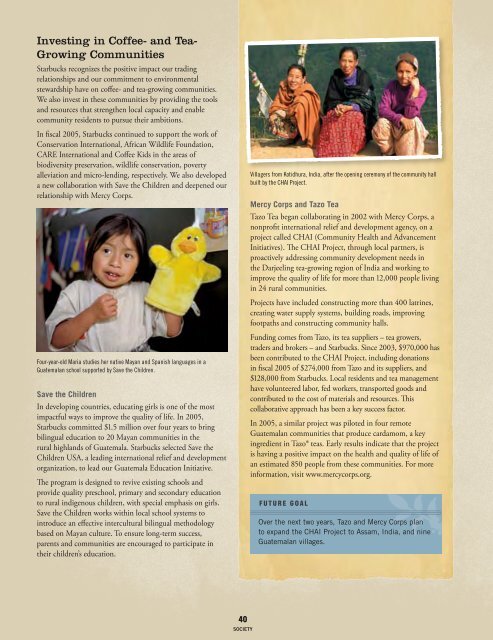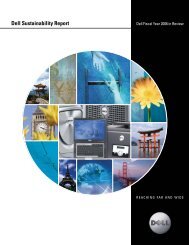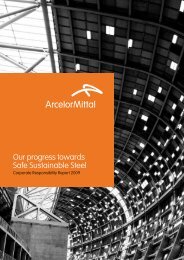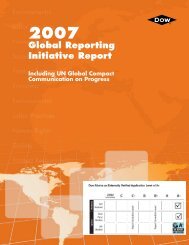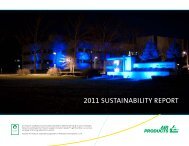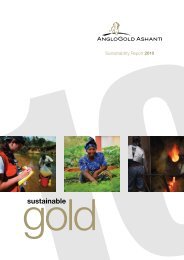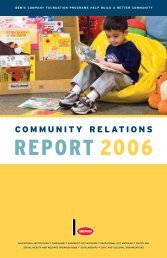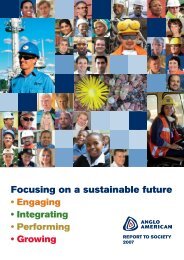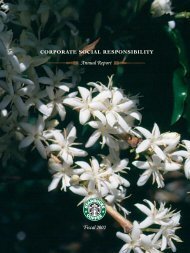Investing in Coffee- and Tea-Growing Communities<strong>Starbucks</strong> recognizes <strong>the</strong> positive impact our tradingrelationships and our commitment to environmentalstewardship have on coffee- and tea-growing communities.We also invest in <strong>the</strong>se communities by providing <strong>the</strong> toolsand resources that streng<strong>the</strong>n local capacity and enablecommunity residents to pursue <strong>the</strong>ir ambitions.In fiscal 2005, <strong>Starbucks</strong> continued to support <strong>the</strong> work ofConservation International, African Wildlife Foundation,CARE International and Coffee Kids in <strong>the</strong> areas ofbiodiversity preservation, wildlife conservation, povertyalleviation and micro-lending, respectively. We also developeda new collaboration with Save <strong>the</strong> Children and deepened ourrelationship with Mercy Corps.Four-year-old Maria studies her native Mayan and Spanish languages in aGuatemalan school supported by Save <strong>the</strong> Children.Save <strong>the</strong> ChildrenIn developing countries, educating girls is one of <strong>the</strong> mostimpactful ways to improve <strong>the</strong> quality of life. In 2005,<strong>Starbucks</strong> committed $1.5 million over four years to bringbilingual education to 20 Mayan communities in <strong>the</strong>rural highlands of Guatemala. <strong>Starbucks</strong> selected Save <strong>the</strong>Children USA, a leading international relief and developmentorganization, to lead our Guatemala Education Initiative.The program is designed to revive existing schools andprovide quality preschool, primary and secondary educationto rural indigenous children, with special emphasis on girls.Save <strong>the</strong> Children works within local school systems tointroduce an effective intercultural bilingual methodologybased on Mayan culture. To ensure long-term success,parents and communities are encouraged to participate in<strong>the</strong>ir children’s education.Villagers from Kotidhura, India, after <strong>the</strong> opening ceremony of <strong>the</strong> community hallbuilt by <strong>the</strong> CHAI Project.Mercy Corps and Tazo TeaTazo Tea began collaborating in 2002 with Mercy Corps, anonprofit international relief and development agency, on aproject called CHAI (Community Health and AdvancementInitiatives). The CHAI Project, through local partners, isproactively addressing community development needs in<strong>the</strong> Darjeeling tea-growing region of India and working toimprove <strong>the</strong> quality of life for more than 12,000 people livingin 24 rural communities.Projects have included constructing more than 400 latrines,creating water supply systems, building roads, improvingfootpaths and constructing community halls.Funding comes from Tazo, its tea suppliers – tea growers,traders and brokers – and <strong>Starbucks</strong>. Since 2003, $970,000 hasbeen contributed to <strong>the</strong> CHAI Project, including donationsin fiscal 2005 of $274,000 from Tazo and its suppliers, and$128,000 from <strong>Starbucks</strong>. Local residents and tea managementhave volunteered labor, fed workers, transported goods andcontributed to <strong>the</strong> cost of materials and resources. Thiscollaborative approach has been a key success factor.In 2005, a similar project was piloted in four remoteGuatemalan communities that produce cardamom, a keyingredient in Tazo ® teas. Early results indicate that <strong>the</strong> projectis having a positive impact on <strong>the</strong> health and quality of life ofan estimated 850 people from <strong>the</strong>se communities. For moreinformation, visit www.mercycorps.org.FUTURE GOALOver <strong>the</strong> next two years, Tazo and Mercy Corps planto expand <strong>the</strong> CHAI Project to Assam, India, and nineGuatemalan villages.40SOCIETY
Supporting Local Communitiesin Our International MarketsIn our international markets, <strong>the</strong>re are countless examplesof how <strong>Starbucks</strong> supports local communities throughphilanthropy, partner engagement and by opening our doorsfor community events.Helping to improve <strong>the</strong> lives of children is a common <strong>the</strong>mein nearly all of our international community efforts. Here aresome examples that represent our activities in fiscal 2005.ASIA PACIFIC• China – Our business partners funded programs that serveAIDS-affected children through <strong>the</strong> sale of special braceletsavailable in some of our local stores. The proceeds included<strong>the</strong> sale of nearly 20,000 bracelets in our north and eastChina stores.• Japan – Nearly 90 <strong>Starbucks</strong> Japan partners volunteeredfor <strong>the</strong> Special Olympics, competitive games geared forchildren with disabilities. In addition, <strong>Starbucks</strong> Japandonated 5 million yen ($46,000) to <strong>the</strong> Special Olympics.• Singapore – Our partners formed a relationship withPathlight, a school for autistic children. They participatedin <strong>the</strong> school’s fundraising events and provided valuable inkindsupport for Café @ Pathlight, a program that buildsemployable skills among <strong>the</strong> students.• The Philippines – A partnership between <strong>Starbucks</strong>Philippines and UNICEF led to <strong>the</strong> creation ofSparkHope, an initiative to address <strong>the</strong> pressing needfor improved early childhood education, especially in<strong>the</strong> outlying barangays (villages). <strong>Starbucks</strong> stores haveadopted various barangays and run in-store campaigns toheighten awareness and raise funds.Supporting Aboriginal Children in TaiwanSince 1999, when <strong>the</strong>re were just 25 <strong>Starbucks</strong> stores inTaiwan, we decided to support education programs foraboriginal children, a population considered to be among thiscountry’s neediest residents. <strong>Starbucks</strong> Taiwan joined forceswith World Vision Taiwan after a devastating earthquake in1999. Taiwan’s aboriginal people were particularly hard hit,losing <strong>the</strong>ir homes and <strong>the</strong>ir sources of income.<strong>Starbucks</strong> Taiwan launched an initial campaign in 1999,which has since become an annual summer fund raiser thatincludes collecting customer donations and selling mugsand penholders that are imprinted with <strong>the</strong> figure “ANAI”representing aboriginal children. All <strong>the</strong> funds raised havebeen directed to World Vision Taiwan and mostly used to payfor tuition and school supplies for aboriginal children and tofund improvements to <strong>the</strong>ir schools. After six years, <strong>Starbucks</strong>Taiwan has raised more than $500,000 and helped thousandsof children have <strong>the</strong> opportunity to attend school.Located on <strong>the</strong> shore of China’s Yangtze River in Shanghai, this <strong>Starbucks</strong> offerscustomers plenty of seating both in <strong>the</strong> store and on <strong>the</strong> outside terrace.Expanding in ChinaSince 1999, <strong>Starbucks</strong> has opened 209 stores in Chinathrough a combination of licensed and joint venturebusiness partnerships and company-owned operations.We are leveraging our existing relationships while also creatingnew opportunities to significantly increase our presence inthis high-growth market, believing China will become oneof <strong>Starbucks</strong> largest markets, second only to <strong>the</strong> U.S.<strong>Starbucks</strong> continued expansion in China will create new jobsfor local residents. Our employment practices in China includeconducting periodic evaluations to ensure that <strong>Starbucks</strong>is a best place to work. To improve partner safety, we arecommitted to maintaining a minimum two-person team inour stores.<strong>Starbucks</strong> commitment to contribute positively to China’slocal communities began at <strong>the</strong> time we opened our firststores. <strong>Starbucks</strong> has reaffirmed our commitment by pledging$5 million (approximately 40 million renminbi) to launch<strong>the</strong> <strong>Starbucks</strong> China Education Project, which will supporteducational programs in China. The project, which wasannounced in September 2005, will be overseen by a steeringcommittee comprising <strong>Starbucks</strong> executives, representativesof <strong>the</strong> Chinese Ministry of Education, <strong>the</strong> Soong Ching LingFoundation, <strong>the</strong> All China Women’s Federation and localcommunity organizations.a41SOCIETY


